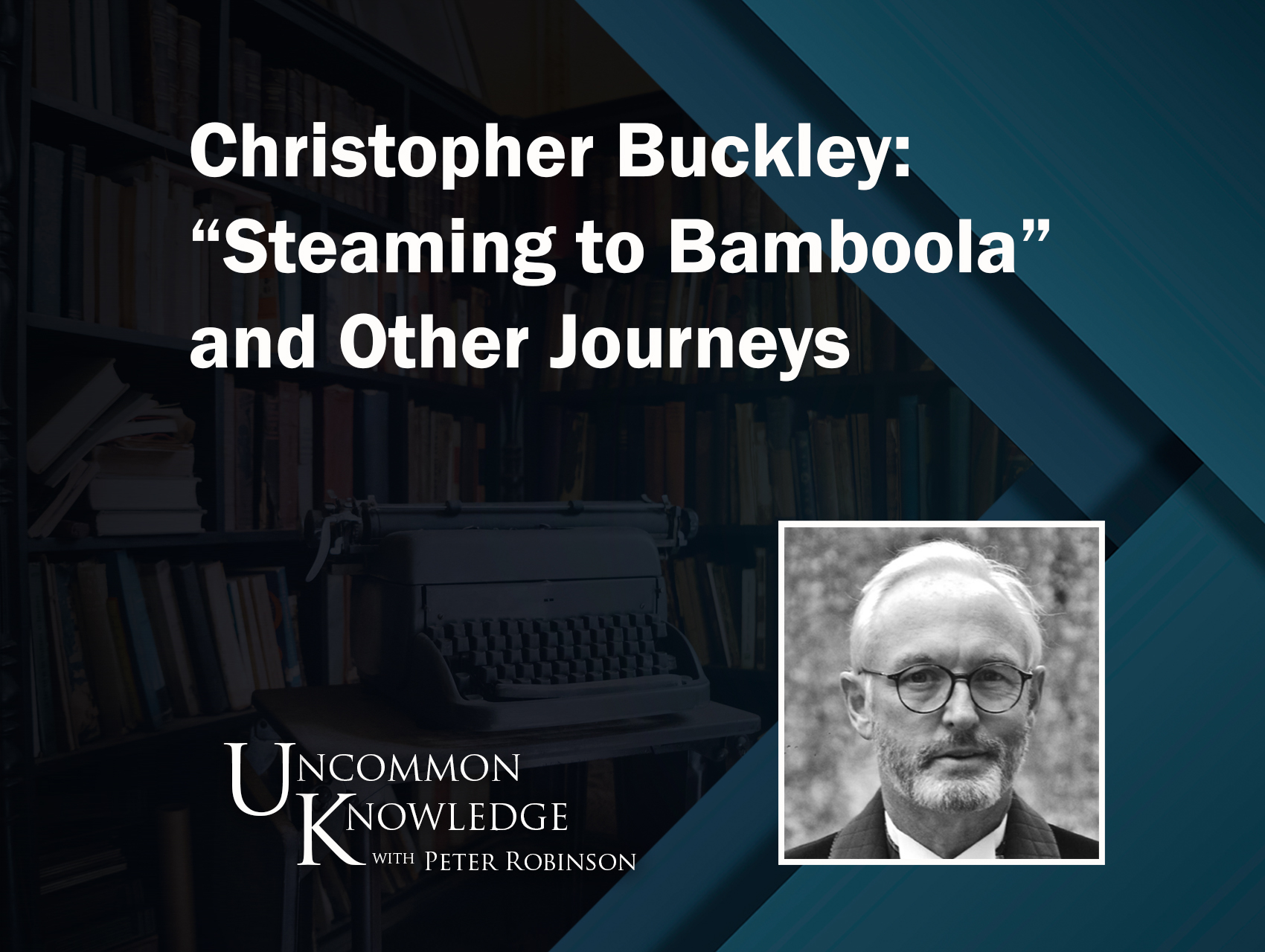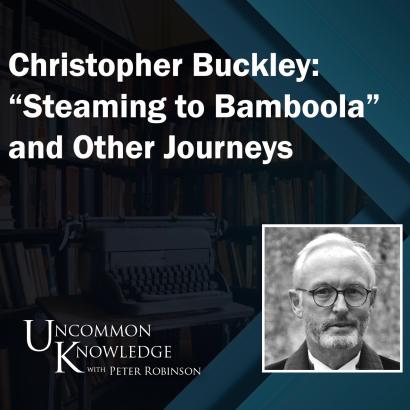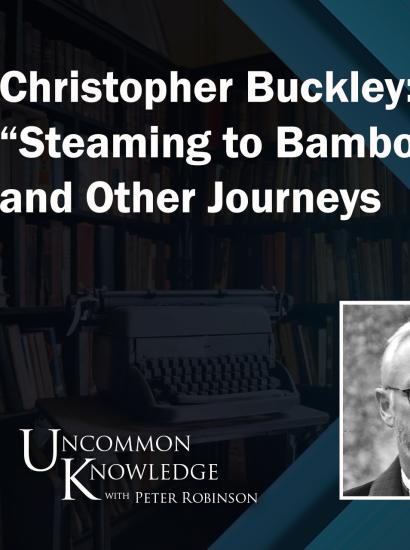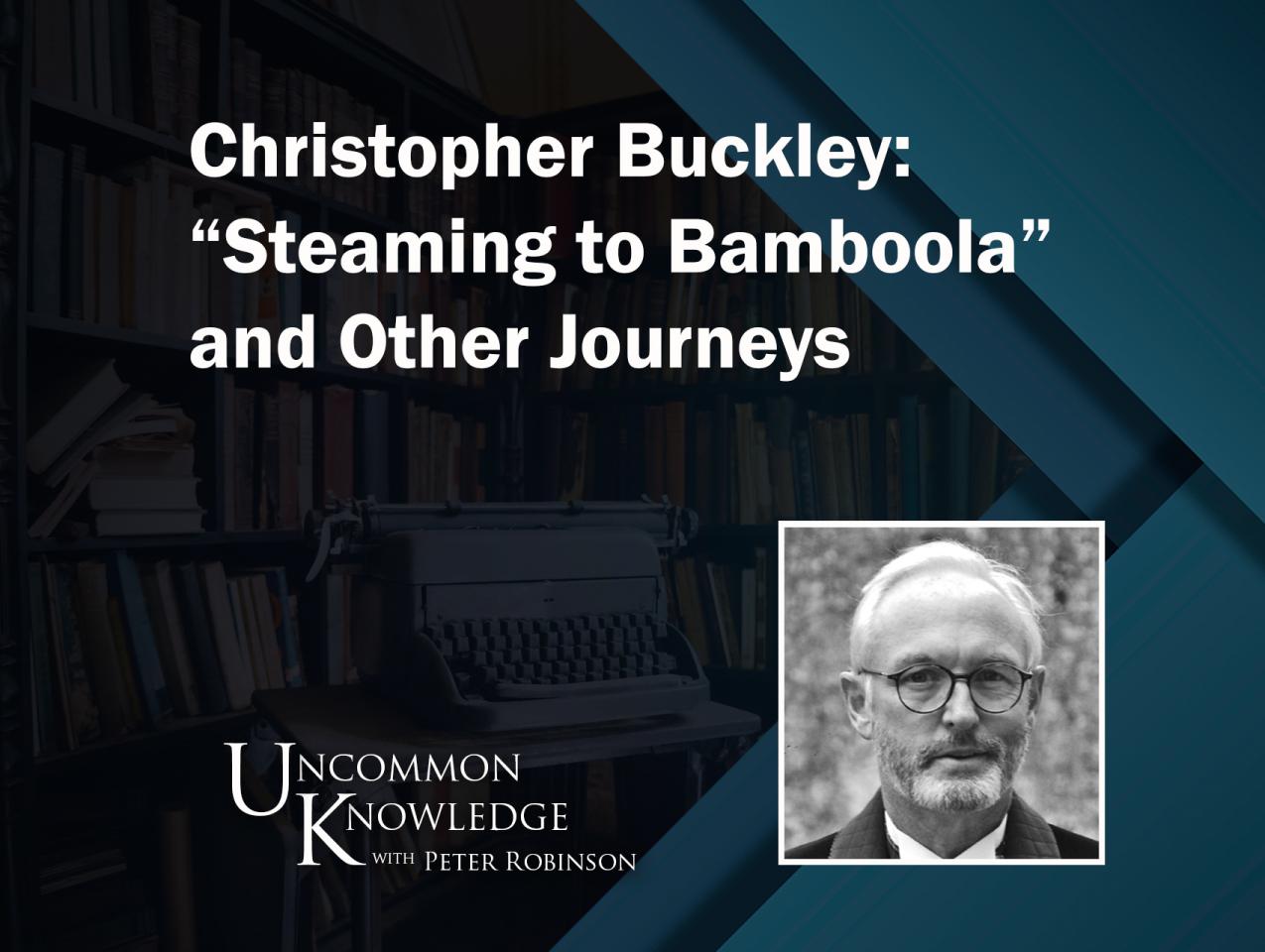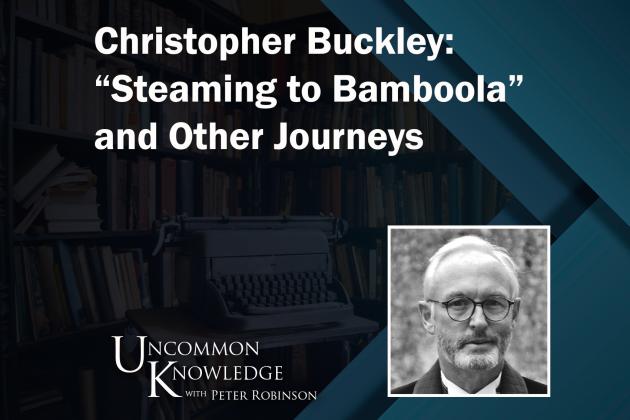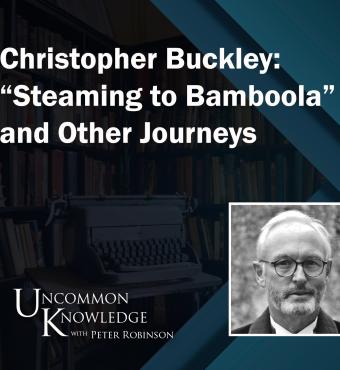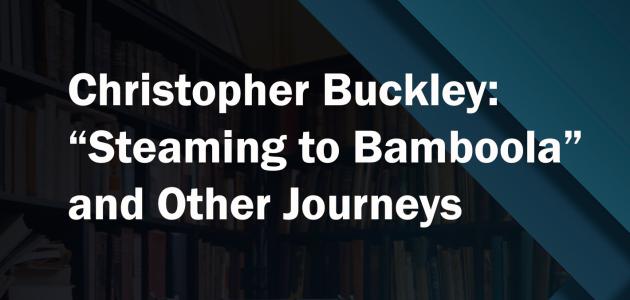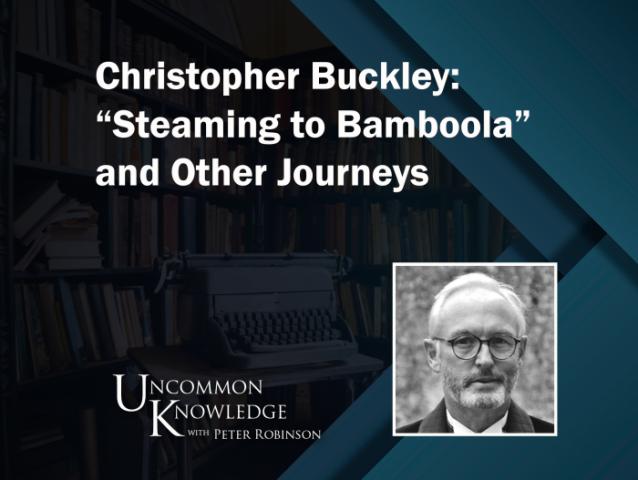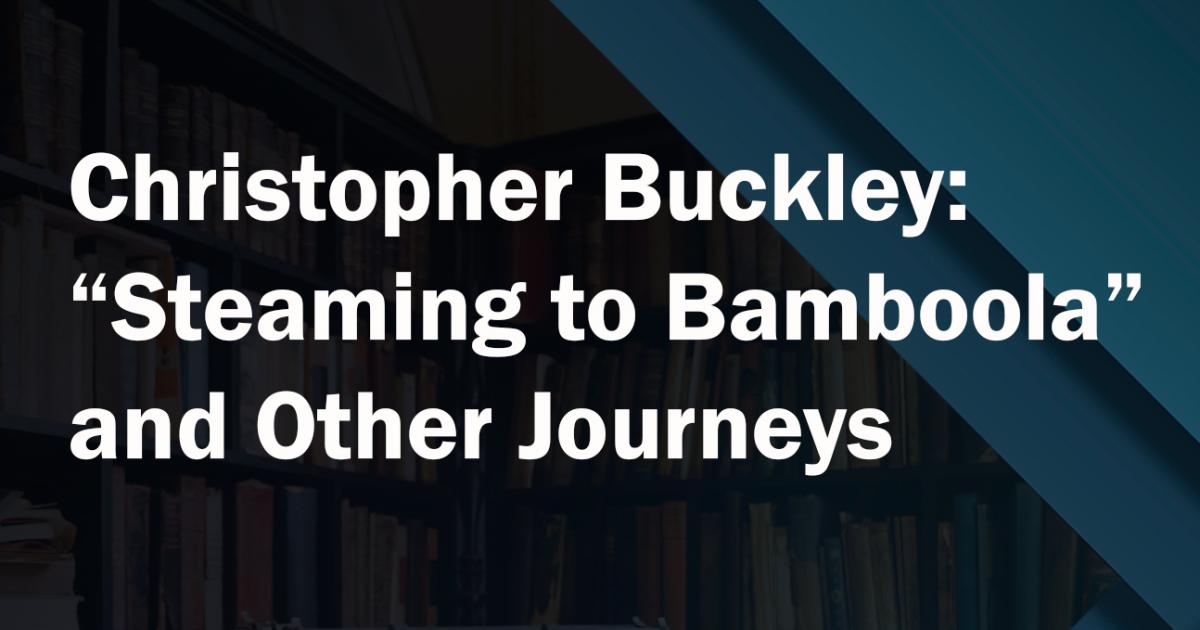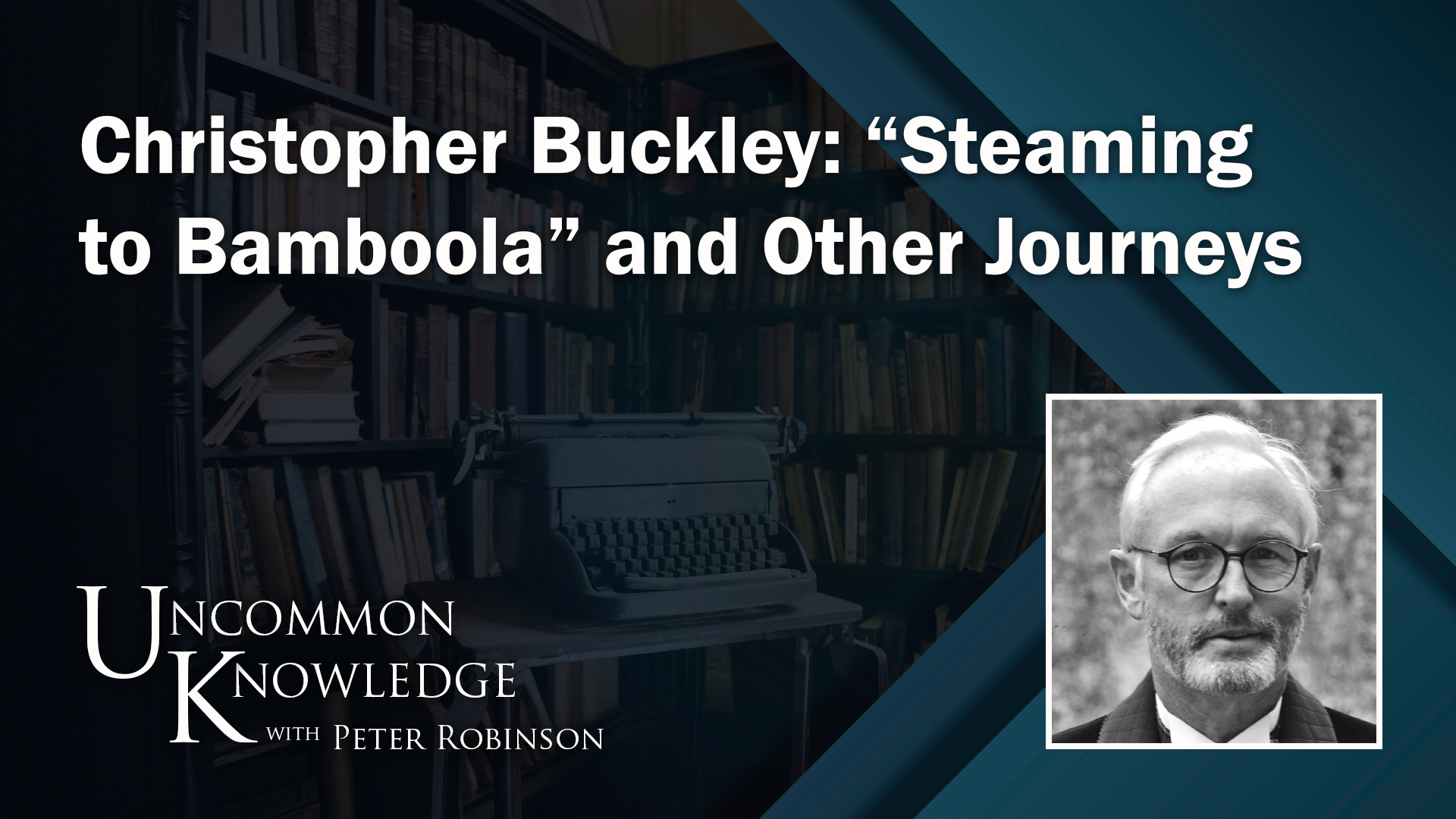- Public Opinion
- Politics, Institutions, and Public Opinion
- Understanding Public Opinion
In this wide-ranging and richly entertaining conversation, novelist and political satirist Christopher Buckley joins Peter Robinson for a reflection on writing, legacy, friendship, and grace. From their early days as speechwriters for George H. W. Bush to Buckley’s prolific career as an author of more than 20 books—including Thank You for Smoking and Steaming to Bamboola—the two longtime friends revisit the formative moments, literary inspirations, and unforgettable characters that shaped Buckley’s life and work.
Buckley offers sharp, often hilarious insight into the craft of satire, the absurdities of Washington politics, and the cultural shifts in American media and manners. The conversation also turns poignantly to Buckley’s late parents, Patricia and William F. Buckley Jr., his transition from political fiction to historical novels, and the enduring influence of figures like Ronald Reagan and George H. W. Bush. Woven throughout is a deep appreciation for civility, wit, and the lost art of gentlemanly discourse—an ethos embodied by the towering figures of a previous generation, now honored in memory.
With warmth and self-deprecating humor, Buckley closes the interview by discussing his father’s typewriter (which Christopher has donated to the Hoover Institution Archives), on which William Buckley composed the National Review's formative mission statement: to “stand athwart history and yell stop”; and by reading from the epilogue of Steaming to Bamboola, offering a quietly moving meditation on departure and legacy.
Recorded on March 13, 2025
WATCH THE VIDEO
>> Peter Robinson: Essays, book reviews, and more than 20 novels, including a great deal of political satire. A thoroughly American life of letters. Christopher Buckley on Uncommon Knowledge, now. One of the country's most prolific political satirists, Christopher Buckley graduated from Yale, became an editor at Esquire, served as speechwriter to Vice President George H W Bush, then began writing books.
Mr. Buckley's more than 20 volumes include Steaming to Bamboola, his 1982 chronicle of life aboard a tramp steamer. His 1994 lampoon of Washington lobbyists, Thank You For Smoking, which was made into a movie. And his 2009 memoir, Losing Mum and Pup, about the year in which he lost both his mother and his father, the journalist William F Buckley Jr, Christopher Buckley, welcome.
>> Christopher Buckley: Good to be here.
>> Peter Robinson: I should state, for purposes of full disclosure, that you and I have been friends for four decades.
>> Christopher Buckley: We have backgrounds.
>> Peter Robinson: Yes, we do.
>> Christopher Buckley: There's a back-
>> Peter Robinson: We have background.
>> Christopher Buckley: There's a backstory.
>> Peter Robinson: What's the backstory?
>> Christopher Buckley: One of the smartest things I ever did was to bring you aboard, the George H W Bush speechwriting team.
Which had been known for a while as the Christopher Buckley era, and then quickly became superseded by the Peter Robinson era. And then you went on to even greater glory as a Ronald Reagan speechwriter.
>> Peter Robinson: Thank you.
>> Christopher Buckley: And you wrote probably the most famous words he uttered as president.
Mr. Gorbachev, tear down this wall.
>> Peter Robinson: Thank you very much, we will edit that out for the purposes
>> Christopher Buckley: No, no, no, no.
>> Peter Robinson: I'll play that for my children only, thank you.
>> Christopher Buckley: I'm here to talk about you.
>> Christopher Buckley: Well, not really.
>> Peter Robinson: That will make this a difficult conversation.
>> Christopher Buckley: Actually, the title of one of my books is But Enough About You.
>> Peter Robinson: But exactly. All right, so we start. We start when you and I, no, we start a little bit before you and I actually met each other. By the way, you remain what you have been in my eyes for the last 43 years, I think we've known each other.
>> Christopher Buckley: Is it that long?
>> Peter Robinson: Which is the coolest kid I know.
>> Christopher Buckley: You.
>> Peter Robinson: Okay, so-
>> Christopher Buckley: You're kind.
>> Peter Robinson: By the time we met, you had already been an editor at Esquire. A brilliant start, I remember a profile you did of the King of Spain, who was then a dashing young figure in those days.
Which was titled, of course, The Reign In Spain. Get it?
>> Christopher Buckley: Not bad.
>> Peter Robinson: So you wanted to be a writer. And then there was the Yale Daily. You were not editor of the Daily News but there was a-
>> Christopher Buckley: Yale Daily News magazine.
>> Peter Robinson: The magazine, okay.
>> Christopher Buckley: And my colleagues on that staff were John Tierney, who's gone on to brilliant things. He had a 25-year career at the New York Times and is now leading contributor to the Manhattan.
>> Peter Robinson: The City Journal, yes.
>> Christopher Buckley: Yes, the City Journal.
>> Peter Robinson: Right.
>> Christopher Buckley: Also aboard, Michiko Kakutani.
>> Peter Robinson: I didn't know that.
>> Christopher Buckley: Who became the most influential book reviewer in the country. Jane Mayer, of the-
>> Peter Robinson: New Yorker?
>> Christopher Buckley: Now of the New Yorker. She had been at I think the Wall Street Journal, but she's one of the country's leading journalists. Lloyd Grove, who was with the Washington Post for 25 years.
So it was pretty, it was not a bad talent pool, myself excluded, I'm building a wall around me. But these were really talented people.
>> Peter Robinson: So there you were-
>> Christopher Buckley: They went on to great, great careers.
>> Peter Robinson: There you are as an undergraduate and you've already decided that you wanna be a writer.
>> Christopher Buckley: Well, with my math skills, such as they were, writing was pretty much-
>> Peter Robinson: Computer science was out of the question.
>> Christopher Buckley: Pretty much the only avenue open to me. But I did want to write and I did.
>> Peter Robinson: So, your father was a large, large figure in many lives, including mine.
You're his son, I have thought many times over the years that if I had been that man's son, I would have sold knishes on the street in Manhattan. I would have done anything other than become a writer.
>> Christopher Buckley: I contemplated a career selling knishes.
>> Christopher Buckley: But at last it was a short-lived dream.
>> Peter Robinson: But did it cross your mind, how do I do this? How do I do this while getting out from under WFB?
>> Christopher Buckley: There are advantages and disadvantages to being in the same business as your father if your father is a star in that business.
>> Peter Robinson: Right.
>> Christopher Buckley: But he was always very supportive without being, I mean, he never once urged me to be a writer and he was very often to my disappointment, my best critic.
>> Peter Robinson: Did you pass manuscripts back and forth?
>> Christopher Buckley: Sure.
>> Peter Robinson: You did?
>> Christopher Buckley: Sure, and one of the advantages and one of the really great things about being in the same business as your dad is you get to talk shop. And what do writers talk about mostly? I'll tell you what they talk about.
They talk about money.
>> Christopher Buckley: How much are they paying you for that piece?
>> Peter Robinson: They're paying by the word or by the piece, yes, right?
>> Christopher Buckley: Well, when I was in college and we all wanted, my colleagues at the old Daily News magazine, all we wanted to be was freelance writers.
Can you imagine? And at the time, the top pay in the freelance writing field was Playboy, which paid $1 a word. You have to imagine Austin Powers saying that, $1 a word.
>> Christopher Buckley: At college, for one of the issues, we decided to send letters to all the famous writers we could think of.
Saying, the letter began, dear Mr. Malamud, dear Mr. Heller, dear Cynthia Ozick, dear John Updike. Congratulations, you have been chosen by the staff of Yale Daily News magazine as a great writer. And we would therefore like to commission an original piece from you, and we can pay $1 a word.
Next paragraph, unfortunately, our budget means that we can only commission you to write a ten-word article.
>> Christopher Buckley: And you'd be surprised who we got, I mean we got-
>> Peter Robinson: Really?
>> Christopher Buckley: We got Uptike, we got Tom Wolfe, we got Joan Didion, we got Bernard Malamud, we got Anthony Burgess.
Well, they were all sort of charmed by this.
>> Peter Robinson: Of course.
>> Christopher Buckley: And Tom Wolfe sent us a 20 The theme was the end of the world, so that was-
>> Peter Robinson: The end of the world in ten words.
>> Christopher Buckley: Well, so Tom Wolfe, he gave us 16 words and he said, please send the extra $6 to William Styron, the Connecticut novelist, to help cheer him up.
And so we were titillated to think that we'd been drawn into this, some kind of literary feud between two of the gods of American writing. Anyway, so we had fun and some of us went on to write for, I think it's safe to say we went on to write for less than $1 per word.
>> Peter Robinson: All right, your first book, I have here the 40th anniversary reissue. Your first book is Steaming to Bamboola, a chronicle of life at sea aboard a tramp freighter, all right? And when I reread this, after the passage of 40 years, I read the first edition and the 40th anniversary reissue, and in between, I confess I'd forgotten everything about the book.
I was delighted to find that it was wonderful. But I thought to myself, I've never quite understood, where is Bamboola? So I looked it up, I actually pulled up an artificial intelligence agent and said, where did Christopher, what did he have in mind? And here's what I got, Buckley uses Bamboola as a metaphor for an elusive destination, the phrase thus encapsulates a sense of a perpetual voyage.
>> Christopher Buckley: You got that from AI?
>> Peter Robinson: Artificial intelligence.
>> Christopher Buckley: That's scary.
>> Peter Robinson: So you have introduced a phrase into the language. Where did this book come, what's the inspiration for Steaming to Bamboola?
>> Christopher Buckley: I was sent off to the Benedictine monks at the age of 13 for boarding school in Rhode Island.
I've been sad to say, I've been a disappointment to the monks ever since. But the school was on Narragansett Bay.
>> Peter Robinson: Where in Portsmouth?
>> Christopher Buckley: Portsmouth Avenue and the bay would freeze over, we had severe winters. But the Coast Guard ice breakers would cut a channel in the ice so that the big ships going to and from Providence could get in and out.
And so we would go walk out on the ice, like a half a mile out on the ice so we could smoke cigarettes undisturbed. And one day I was standing right at the edge of the ice, maybe three quarters of a mile out, and a freighter passed by and there was a crewman on the poop deck, coiling lines.
And he looked up and saw this sort of improbable sight, a 16 year old in a blazer and tie smoking a cigarette. I guess he was sort of charmed by this apparition and he did something very cool, he said, as in,jump.
>> Peter Robinson: Come with me, come with me.
>> Christopher Buckley: And that was a very romantic moment to me, and I decided one day I would go to sea and so I did.
>> Peter Robinson: Steaming to Bamboola, I'm quoting here. I won't go on and on, you've flattered me, so I will flatter you.
>> Christopher Buckley: Do, please.
>> Peter Robinson: The book is full of character and the dialogue is super, all right.
>> Christopher Buckley: Let thy praise flow trippingly from the tongue.
>> Peter Robinson: When he was not yelling and carrying on, the Bosun ran a poker game. He was making crazy bets, a hundred dollars on the cut of the cards, a hundred on whether pork chops would be served for dinner tomorrow.
He had almost no booze left, which put a desperate edge on his drinking. One morning, Slim, different character, Slim, ran up to the captain's cabin and begged him for just one can of beer. Slim never drank at all, so the captain asked him why. Slim said the Bosun was going to give him a cuckoo clock in exchange for it.
>> Christopher Buckley: I'd forgotten that.
>> Peter Robinson: The captain handed Slim the beer, and shook his head. He was hoping the booze would run out soon. Things were getting out of hand.
>> Peter Robinson: So this book appears when you're 29 years old, and now that you've told me the fellow staff members at the Yale Daily News magazine, maybe, but did you.
I'm trying hard not to make this sound like sheer flattery, did you know how good you were? The book was extremely well reviewed.
>> Christopher Buckley: How do I answer that? The process of writing it persuaded me that I was arguably the worst writer in the world. I was very fortunate to have as an editor a really great man of American letters.
My editor was a guy named Tom Congdon, who is slightly more famous at being my editor than for editing a book about a vengeful shark. I believe the title was Jaws, and it became, I think, at the time, a bigger seller than the Bible. I worked on this very hard, I think there were 650 pages, which to a rookie writer, feels cool.
You feel, my God, I'm Dostoevsky, and here are 650 pages.
>> Peter Robinson: Big typescript.
>> Christopher Buckley: And Tom called, he said, it's wonderful, it's even better than I had hoped. So I walked on air for about two weeks and then arrives in the mail a rather suspiciously thick manila envelope with Tom's notes, 50 pages, single spaced.
And I called him, I said, Tom, I thought you liked it, I thought you said it was good. He said, it is, and it's going to be so much better.
>> Peter Robinson: So I realize as we speak that you and I are talking about a lost world, we remember it, but it's a lost world.
Is there an editor in New York who would give line by line notes like that today, 50 pages, single spaced?
>> Christopher Buckley: I have a sense that the late Bob Gottlieb, who is considered the greatest book editor of our era who has been Robert Caro's editor on four or at this point five volumes of Lyndon Johnson bios, I get the sense he may well have been.
Bob Gottlieb was also famously editor of Catch-22, one of the great, probably arguably the great comic novel, American comic novel of the 20th century. I don't know, but the stories one hears are sobering. One of my great friends was Sylvia Morris, wife of Edmund Morris, a great biographer and she was a great biographer.
And I hardly urge anyone watching this To read her two volumes of Clare Boothe Luce, who was, I think, really, the outstanding American woman of the 20th century, for reasons good and maybe otherwise.
>> Peter Robinson: But wonderfully readable.
>> Christopher Buckley: Amazingly,
>> Peter Robinson: even the bad bits.
>> Christopher Buckley: The point of my story, and I do have one is, so Sylvia Hands in volume two, which is stunning work.
And seven weeks go by with no word from her editor, imagine that, seven weeks. And she's worked on this for 15 years, and then finally on week eight her phone rings, she says, it's great.
>> Peter Robinson: The world has changed.
>> Christopher Buckley: Yeah.
>> Peter Robinson: Yeah, the satirist appears, 1986, the publication of your first novel, The White House Mess, narrated by Herbert Wadlough, an assistant to the fictional President Tucker.
And the opening scene takes place as the newly elected President Tucker arrives at the White House to move in on Inauguration Day.
>> Christopher Buckley: On January 20th, 1989.
>> Peter Robinson: 1989, and the then outgoing incumbent, Ronald Reagan, simply decides that he doesn't care to leave. Herb said the President-elect barely above a whisper.
This is Tucker talking to Wadlough, the narrator and main character, we have a situation here, President Reagan won't leave. The President-elect turned to President Reagan's physician commander, is there something you can do? The commander said the president might respond to two cc's of adrenaline-
>> Peter Robinson: But that at his age, it might provoke an undesirable reaction.
When the President-elect asked what sort of undesirable reaction, the commander replied, death. A tabloid headline played before my eyes, Reagan killed by injection by incoming President. I am not usually forceful at meetings, but I spoke up and offered my frank opinion that this was not a viable option, close quote.
Okay, wonderful. Questions, why from fiction to nonfiction? And why, you and I sat in desks next to each other writing speeches for George H W Bush, whom you revered and continue to revere.
>> Christopher Buckley: And you were looming larger and larger
>> Peter Robinson: And you were totally down with the end of the Cold War program of cutting taxes.
>> Christopher Buckley: You and I, together, won the Cold War.
>> Peter Robinson: We won the Cold War.
>> Christopher Buckley: I mean, let's pat ourselves on the back.
>> Peter Robinson: After all these years, credit where credit is due. But at some level, in the back of your mind, you're watching it all happen and thinking, this is perfectly preposterous.
You must have been at some level. So why do you move from nonfiction to fiction? And why are you satirizing a life that you led?
>> Christopher Buckley: Well, I worked for Mr. Bush for, I guess, a total of almost two years. And in the course of that, being at the White House, I read, recreationally, a lot of White House memoirs.
As you know, anyone who has worked at the White House for more than five minutes writes at least a 500-page memoir about their time there, which usually has in the title the word power, principle, and other rather inflated nouns. But I became fascinated by this sort of subgenre of White House memoirs.
And it was one of those rare moments where a light bulb goes off. You thought that would be fun to parody cuz also in the course of working at the White House, I learned a lot about the White House, stuff that I could use. And it opens with that scene.
The book came out in 1986 while President Reagan was halfway through his second term. The notion in 1986 of a president reluctant to leave the White House was, shall we say, still a quaint notion-
>> Peter Robinson: Yes.
>> Christopher Buckley: Even comic. And the opening of the book sort of gave it headlines, gave it traction, and it became a New York Times bestseller, which was very nice.
But at one point I began to worry about the Reagans, whom I had known for many years. Dear, I wonder if they're finding this funny too. And in a press interview with the Washington Post, I admitted that I was a little bit nervous as to what their reaction would be.
In short order arrived a handwritten note, just said, The White House, and no stamp. So yeah, who gets to do that? And so I tremulously opened it. And it was a handwritten note from the Gipper, from Ronald Reagan, saying, Dear Chris, I just wanted to say I'm delighted by the book and tickled to have been part of its success.
>> Peter Robinson: Lovely.
>> Christopher Buckley: And what grace. What grace was there? Who else would? Well, I'll tell you who else would write that, George H W Bush.
>> Peter Robinson: George Bush would have written that.
>> Christopher Buckley: George Bush would have written that. They both possessed extraordinary grace and decency.
>> Peter Robinson: And it mattered to both of them, gentlemanliness mattered to both of them.
>> Christopher Buckley: Utterly, as you recall, you spent a lot more time in the Oval Office than I did. Mr. Reagan never took off his jacket-
>> Peter Robinson: Correct.
>> Christopher Buckley: In the Oval Office because he thought it would have been disrespectful.
>> Peter Robinson: To his own office.
>> Christopher Buckley: To his own office.
>> Peter Robinson: Little green men, the list of your satires goes on and on. Let's pause for a moment, though, in 1994, and Thank You For Smoking. Incidentally, our friend, the journalist, Andy Ferguson. Andy and I were talking the other day, and he said, The White House Mess and Thank You For Smoking are the two funniest books ever written about Washington.
You and I have the same regard for Andy, coming from Andy, that means something.
>> Christopher Buckley: I think Andy is, for my money, among the top three writers of our generation. And into the bargain, a lovely, lovely man. A great friend of the late P.J. O'Rourke, whom I think we all miss deeply.
Anyway, Andy obviously is also a man of excellent literary taste.
>> Christopher Buckley: He said self serving.
>> Peter Robinson: Main character in Thank You for Smoking is Nick Naylor, who is a completely winsome character, intelligent, warm, funny, sweet, and a lobbyist for the tobacco industry. Thank You For Smoking is such a hit that it has turned into a 2005 film of the same title.
Thank you for smoking. A brief excerpt from that film.
>> Joan: This is obviously a heated issue, and we do have a lot that we wanna cover today. Nick, do you have a question?
>> Nick Naylor: Joan, how on earth would Big Tobacco profit off of the loss of this young man?
>> Nick Naylor: Now, I hate to think in such callous terms, but if anything, we'd be losing a customer. It's not only our hope, it's in our best interest to keep Robin alive and smoking.
>> Ron Goode: That's ludicrous.
>> Nick Naylor: Let me tell you something, Joan, and please let me share something with the fine, concerned people in the audience today.
The Ron Goodies of this world want the Robin Willigers to die.
>> Ron Goode: What?
>> Nick Naylor: You know why? So that their budgets will go up. This is nothing less than trafficking in human misery. And you, sir, ought to be ashamed of-
>> Peter Robinson: Where did Nick Naylor come from, how did you devise this character?
>> Christopher Buckley: I'll tell you exactly-
>> Peter Robinson: So outrageous.
>> Christopher Buckley: Many years ago, I was watching, as it was then called, the McNeil Lehrer Report, and the latest scientific evidence had just been established that smoking isn't good for you. This was evidence number 19,342. So they had on the scientist who had published this paper in the New England Journal of Medicine, and he had so many PhDs after his name that it wouldn't have fit on a business card.
And as he spoke, you could almost see the footnotes scrolling beneath him. So, because of notions of fairness, old fashioned notions of fairness and balance, they had on a very attractive woman, attractive in a sort of a Lauren Bacallish way from the Tobacco Institute, to offer an opposing viewpoint.
And every time this poor epidemiologist said something, she just went, please.
>> Christopher Buckley: Where are the data?
>> Peter Robinson: She said.
>> Christopher Buckley: She said, I think grammatically correctly, where are the data? And I fell in love. I thought, what a fascinating job that must be. You get up in the morning, brush your teeth, dress the kids, send them off to school, and then go to the office and sell death for a living.
And so that was the genesis.
>> Peter Robinson: The writing life, Friends and Heroes, Christopher Buckley and Christopher Hitchens. Everything he said was brilliant. You were very close friends with Christopher Hitchens, you became a close friend of Joseph Heller, although different generations. Joseph Heller, the Author of Catch 22. You were very close to P.J. O'Rourke, you knew Hunter Thompson, you knew Tom Wolfe.
I'm trying-
>> Christopher Buckley: If we were talking about, if all these people were painters, I would be the guy painting by numbers with crayons, in the middle of the Louvre with canvases by, people like that. I was, I count myself very lucky to have known these people. And I miss them, everyone you just mentioned- Is gone.
>> Peter Robinson: Is gone.
>> Christopher Buckley: And I spoke at three, four.
>> Peter Robinson: PJ who?
>> Christopher Buckley: Four, all I do these days is-
>> Peter Robinson: Eulogies.
>> Christopher Buckley: PJ, Christopher, Heller and Tom Wolf.
>> Peter Robinson: And Tom Wolf.
>> Christopher Buckley: But I consider myself very fortunate to have gotten to know these giants. These were gods in my world.
>> Peter Robinson: What influence did they have on you as a writer, did you study anybody's style?
>> Christopher Buckley: Well, I think you consciously or unconsciously always-
>> Peter Robinson: Always.
>> Christopher Buckley: Studying their style. I remember in college the two hot writers we all worship from afar were Tom Wolfe.
>> Peter Robinson: Tom and Thompson.
>> Christopher Buckley: And Hunter Thompson.
>> Peter Robinson: Mm-hm.
>> Christopher Buckley: And as rookies, newbies, I believe in current apartments we committed the cardinal idiocy of imitating them. So, pretending to write, we're channeling Tom Wolf and Hunter Thompson. And, if you showed me stuff that I wrote in those days in that vein, I would ask one of the technicians with us please to hand me Mel Gibson's returned pistol so that I could shoot myself.
The worst thing a young writer can do is to imitate. Although I would note that-
>> Peter Robinson: Cuz you have to go through it, don't you think?
>> Christopher Buckley: Hunter Thompson worked at Time Magazine at one point? I think he also may have worked at Sports Illustrated, but I think it was while he was very low level writer.
And while he was there he retyped Hemingway novels.
>> Peter Robinson: Mm-hm.
>> Christopher Buckley: Because he wanted to figure out how to do it. And that struck me as, now-
>> Peter Robinson: That is setting up your easel at the Louvre.
>> Christopher Buckley: That is setting up-
>> Peter Robinson: And copying Renoir.
>> Christopher Buckley: And copying Renoir.
>> Peter Robinson: Brushstroke by brushstroke, isn't it?
>> Christopher Buckley: Yeah.
>> Peter Robinson: Yeah, all right. But I grant, I'm willing to put up with everything you said, even though you are a master of self deprecation.
>> Christopher Buckley: Well, as they say in Hollywood, if you can fake sincerity.
>> Peter Robinson: You got it made.
>> Peter Robinson: But this book is published when you're 29 and there's nothing imitative about. There's no passage, well, this is second rate Hemingway. Or this is an attempt. There's nothing like that in here. There is an act of synthesis taking place in the young Buckley and it takes place very fast.
All right, I'm just gonna force I'm not even gonna let you comment on that one. You're gonna have to listen.
>> Christopher Buckley: Just lead that way.
>> Peter Robinson: Just take that compliment. The satirist of late, The Relic Master 2015, the action takes place in 16th century Europe. A forger of religious relics tricks a royal collector into believing he has acquired Christ's burial shroud.
When he's found out, he's forced to make up for it by stealing the real shroud. The Judge Hunter 2018, this time the action takes place after the restoration of Charles II. A young Englishman is sent to the New World to track down two of the judges responsible for the execution of the king's father, Charles I.
Kirkus Reviews calls this, quote, a witty bromance about international intrigue, close quote. Incidentally, H.R McMaster, former national security advisor and.
>> Christopher Buckley: A great American and a fantastic writer.
>> Peter Robinson: I'm so happy that you complimented him because he said he wanted me to tell you that he loved the Judge Hunter.
>> Christopher Buckley: All right, that's high praise, I'm sure undeserved, but a terrific guy.
>> Peter Robinson: From political sapphire to historical fiction, why? You had a great gig going there with the political stuff.
>> Christopher Buckley: Well, I had done political satire by that point. I probably, I don't know, banged out ten or so-
>> Peter Robinson: Little green men.
>> Christopher Buckley: And Frankly, Peter, and I wouldn't be surprised if you agreed with this assessment. By this time, American politics had kind of become auto satirical. I mean, I'm not sure it needed satirizing. Another element of it was, let's try something different.
>> Peter Robinson: Right.
>> Christopher Buckley: And the historical novels I found really quite fascinating cuz you have to, well, you have to do a lot of research, you have to read.
I mean I probably read 50 books to write each one of these. But it was like being back in college, only fun.
>> Peter Robinson: I see-
>> Christopher Buckley: But it was all the-
>> Peter Robinson: You say 50 books and it sounds onerous, but actually you enjoyed it.
>> Christopher Buckley: Yeah.
>> Peter Robinson: You wanted to get the details right, but also the feel right.
>> Christopher Buckley: Yeah, yeah, and to do that you gotta do your homework. But the writing I found very challenging. And I actually don't mean this as a sly way, in a self-satisfied way, but I don't think I could write those books now. I'm 72, I was in my early 60s when I wrote those and I don't think I have the stamina.
>> Peter Robinson: I'm not gonna talk you out of that one right now, anyway. Two particular figures, the Vishnu and your father. First, the Vishnu. Everyone listening to this is saying, who on earth is the Vishnu? And you're going to tell us. Christopher.
>> Peter Robinson: Let me begin. Christopher Buckley and George H.W. Bush, Mr. Bush was, to be sure, an ur Yankee blue-blood establishmentarian, but he was always winking at you.
The Vishnu was the most considerate man I have ever known. The Vishnu.
>> Christopher Buckley: I went to work for Mr. Bush in 1981. This is now referred to as the pre Peter Robinson era. And he had recently been gifted, to use that odd verb, a statue by a, I think the Indonesian ambassador to the United States, whom he had known when Mr. Bush was the US ambassador to the United Nations.
He had been gifted a statue of the Hindu God Vishnu with a plaque describing in great detail all of the Vishnu's individual powers which amounted to supreme omnipotence. So Mr. Bush sort of, he liked this and he got a kick out of it. And because he was a man of excellent chest, which is not necessarily New England Yankee quality.
He began referring to himself playfully as the Vishnu. So we'd be on Air Force Two taking off from Minneapolis after a campaign swing there, and over the PA system would come a voice. This is the Vishnu speaking. The Vishnu is well pleased by today's visit to Minneapolis and has proclaimed ordered an extra tot of rum for all the lesser deities.
And anyway, so we all referred to him, at least on the campus, as the Vish. Hey, we gotta go see the Vish about the speech or whatever. Late in his life, I went to visit him in Kennebunkport, and he was at this point, not far from the end, and Parkinson's and other ailments had sort of locked him down bodily.
And I said it's good to see you, Vish, and he'd forgotten.
>> Peter Robinson: Aah!
>> Christopher Buckley: And so I told him-
>> Peter Robinson: You reminded him of this.
>> Christopher Buckley: And his face which had been a bit imprisoned by the medications. There was a distinct smile and that gleam came in and it was really all I could do.
He was a dear man and I think country misses him greatly. I know you miss him.
>> Peter Robinson: I do, I do. Losing mum and pup 2009, a memoir of your final year with your parents, William F Buckley Jr. and Patricia Taylor Buckley, who is less known, but was one of the most remarkable people I've ever known.
>> Christopher Buckley: Yes, a cross between a Noel Coward character and a snapping turtle.
>> Peter Robinson: She made up her mind quickly about people. But if she liked you and one of the great privileges of my life was that somehow or other, within a minute of meeting me-
>> Peter Robinson: Was all right.
>> Christopher Buckley: You made the cut.
>> Peter Robinson: You were all right forever.
>> Christopher Buckley: Their bodies strewn over the landscape of belonging to those who did not make the cut. But she was quite something.
>> Peter Robinson: This is your show, not mine. But there was a fundraising event, I think it was for the Dartmouth Review, and your father was kind enough to come and your mother came and she saw me.
So I came in, everyone was seated, so I got down on my knees next to her, which actually was the correct thing to do.
>> Christopher Buckley: She would have liked that.
>> Peter Robinson: And she said, Peter, what am I doing here? So I had to explain what the Dartmouth. I think I had to tell her what Dartmouth was, yes.
Anyway, again, I won't go on and on, but we visited. When my children were little five children, and at this time, one of them was still an infant. And your mother had set up the table, making no concession to childhood at all, the heavy silver.
>> Christopher Buckley: Finger bowls.
>> Peter Robinson: Finger bowls, except that one of the chairs was a high chair. And she conducted and had went to quit, and then she said, children, pay attention, I'm going to show you how to use a finger bowl.
>> Peter Robinson: All right.
>> Christopher Buckley: I have a feeling that will be a memory with your children for-
>> Peter Robinson: With my children.
>> Christopher Buckley: Many years.
>> Peter Robinson: From Losing Mom and Pup. Years ago, Pup gave an interview to Playboy, Pup is your term for your father. Pup gave an interview to Playboy magazine, asked why he did this, he couldn't resist saying, in order to communicate with my sixteen year old son.
At the end of the interview, he was asked what he would like for an epitaph. And he replied, I know that my Redeemer liveth. Only Pup could manage to work the Book of Job into a Hugh Hefner publication.
>> Christopher Buckley: I used that in my eulogy to Pup at St. Patrick's, I was confused.
>> Peter Robinson: This year marks the centenary of your father's birth, in what ways is this being celebrated?
>> Christopher Buckley: Well, the US Postal Service on September 9th will unveil a stamp, a commemorative stamp honoring Pup. You can't be blase about having a dad who was on a stamp. It occurred to me, I was asked for a comment about it by the Washington Post when it was announced just a few days ago.
And my comment was, makes me wanna take up stamp collecting. But you always think of something better on the way out, the French call it the the being the staircase that you walk down after the dinner. And it occurred to me, Pup in the inaugural issue of national review in 1955, declared that its National Review's mission would be to stand athwart history yelling, stop.
And I wished I had had the wit to say to the Washington Post, now Pup is standing athwart history yelling, stamp.
>> Christopher Buckley: It always happens too late. But anyway, I'm delighted, and I urge you all viewers, the stamp will be available for advance purchase on August 9th. 30,000 post offices, that stamp will be available at 30,000 post offices or on usps.com,
>> Peter Robinson: all right? A century, this is a staggering thought to the likes of you and me, but a lot of viewers will simply not remember the Cold War. They certainly won't remember 1955.
>> Christopher Buckley: You weren't alive.
>> Peter Robinson: I don't remember 1955.
>> Christopher Buckley: I was alive, but really it went right over my head.
>> Peter Robinson: So what should people grasp about your father?
>> Christopher Buckley: There are, I believe, not far from where we are sitting at this table in the Hoover Institute archive, the original tapes of the 1504 episodes of firing line that he taped between 1966 and 1999 when he gave it up.
I think at the time he retired, he held the record for longest single host of a show. And all those episodes, I can't claim to have seen all 1504. But they established a level of civility and yet inquiry that I think is still unmatched except, isn't there a program called Uncommon Knowledge?
Yes, and I'm going to, just sit still because I'm going to say something nice about you, that you are an admirable heir to the standards that Pup sat. He was never mean, he was very often on the attack. But he was attacking you, not on personal grounds or necessarily ideological grounds, but if you were going to debate with him, you had better have your argument ready.
And he had everyone on he was a gentleman, my father. I never honestly heard him say anything mean about anyone, even Gore Vidal, with whom he famously clashed. Famously, and he felt very abashed about that moment. And the only time, that happened in 1968, Vidal left us, not a moment too soon, sometime around 2010 or so.
The only time Pup ever mentioned Gore Vidal after that was in an oddly positive context. I remember Vidal was offered a chair at the American Institute of Arts and Letters.
>> Peter Robinson: Yes.
>> Christopher Buckley: And Vidal, he declined it, saying, thanks, but I already have Diners Club. And Pup thought that was about the funniest thing he'd ever heard.
>> Peter Robinson: Really.
>> Christopher Buckley: Yeah, no, I heard him cite that 20 times.
>> Peter Robinson: Really?
>> Christopher Buckley: Anyway, so I think he set a standard which we would all do well to revere.
>> Peter Robinson: All right, so you're mentioning this exchange between your father and Gore Vidal. At one point, years ago, I went into the stacks of the Stanford Library and found the issues of Esquire in which those two men had explained themselves to the extent, in one issue, your father.
And as I recall, it was the second issue, the next issue was Gore Vidal, I think your father went first. Each of those men wrote 5,000 words, published in a then popular magazine in Esquire. And what I found so striking when I went back and looked at both of those essays is that the editor had not relieved the text with call-outs, or boxes, or photographic inserts.
It was assumed that the subscriber to Esquire magazine was a reader and would enjoy these 5,000 words. I would agree with you and your father that Gore Vidal had very serious drawbacks, in fact, he was the craziest guest I ever had on this program. But he could handle prose, and those two essays were simple.
By the way, the last two words of your father's 5,000 words, 4,000 999.
>> Christopher Buckley: You hereby apologize.
>> Peter Robinson: I apologize. Yes, I apologize. So Christopher, how do you and I tease out the natural tendency to remember the past fondly from actual serious changes in the wider culture? About which, honestly, it might in some way even be our duty to warn our children and their generation.
A loss of gentlemanliness as an ideal, as something that people took very seriously. The three men we were talking about, Reagan, and George H.W Bush, and your dad. And to them, gentlemanly behaviors, civility. Your father admired polemics. I remember his telling me that Hitchens about him. He had some reservations.
>> Christopher Buckley: Well,
>> Peter Robinson: but he loved his polemic ability. Nevertheless, they were all. So gentlemanliness and the literacy. Reagan would never have felt at home in the faculty lounge at Yale. But that man read and wrote constantly. Don't you agree?
>> Peter Robinson: How do we tease it out?
>> Christopher Buckley: Well, there are certain obstacles to civil discourse.
It's in the form of this, and the instant communication. Jonathan Haidt has written, is the author of a current bestseller saying, we are destroying our children by allowing them unfettered access to the Internet and iPhones. And there are movements now taking root, where you have to surrender your iPhone when you walk in school.
And I'm all in favor of that. When you and I were growing up, there were three TV channels, and one extra called, which was always on channel 13.
>> Peter Robinson: Yes.
>> Christopher Buckley: And you had to use a round antenna.
>> Peter Robinson: Yes, exactly. And it was called Educational Television.
>> Christopher Buckley: Educational TV.
And I think at any given evening, roughly over half the households in America would be listening to Walter Cronkite.
>> Peter Robinson: That's right.
>> Christopher Buckley: And you turn on the TV today, you immediately hear the sound of barking and language that, had you used it at home, your mother would have stuck a bar of soap in your mouth.
These are impediments. And now these words are uttered from the highest podia in the country. So I don't know how we get back to that. But we all raise our own children, and a lot depends on that. My father used to say, he was a devout Catholic, and he used to say, despair is a mortal sin.
So one must not despair, but one must make efforts to be civil. I believe the Bible expresses it as, do unto others as you would have others do unto you. Sounds quaint. Still pretty good.
>> Peter Robinson: Still pretty good.
>> Christopher Buckley: Advice.
>> Peter Robinson: Yes, you mentioned your father in the Hoover Institution.
>> Peter Robinson: Thanks to your father's son, Christopher Buckley.
>> Christopher Buckley: That would be me.
>> Peter Robinson: That would be you. On this his centenary celebration, the Hoover Institution not only holds the original master Films of 1504 Episodes of Firing Line, but this typewriter. Tell me about this typewriter.
>> Christopher Buckley: Well, this is the typewriter that launched the modern conservative movement.
This is the typewriter on which he typed that National Review's mission would be to stand athwart history yelling, stamp. So I'm gonna touch it one last time. This was his typewriter at National Review. And as I approach my own doubtlessly disappointing interview with St. Peter, I thought it was time that it go somewhere where it will be cherished.
>> Peter Robinson: It will be cherished.
>> Christopher Buckley: I wrote a book you mentioned, called The Relic Master. This is a relic. And there's something about relics. Anyway, I'm very pleased. And I think he would be pleased.
>> Peter Robinson: I think he would.
>> Christopher Buckley: That it's going somewhere where it will be loved and taken good care of.
And you might even be able to find a ribbon on ebay. But you might-
>> Peter Robinson: It's a royal. It's a royal.
>> Christopher Buckley: It'll probably take some looking for.
>> Peter Robinson: Thank you.
>> Peter Robinson: Christopher, last couple of questions here for now. My demise won't be terribly far off your demise.
So I'm really rather hearing you speak-
>> Christopher Buckley: Let us not talk about your demise.
>> Peter Robinson: Let us not speak of demises.
>> Christopher Buckley: I'm much older than you.
>> Peter Robinson: Please. If I may quote the tobacco industry lobbyist, please. All right, Ronald Reagan, George H.W. Bush, your father. There was an email exchange, or a phone call.
I honestly can't remember quite what. But when we lost one of these men, you said to me, the adults are leaving.
>> Christopher Buckley: The grownups are leaving.
>> Peter Robinson: And there's nobody left but us children.
>> Christopher Buckley: But us children.
>> Peter Robinson: So as we approach our own demises, how do you think they would judge the job we've done?
If they were the greatest generation, do you think we can skate past as the adequate generation?
>> Christopher Buckley: That should be the title of your next book.
>> Peter Robinson: My next book, yeah. Adequate Generation.
>> Christopher Buckley: I miss these. I miss the three people you've just mentioned deeply. I have to say, I'm a little glad they're not around to see what's going on now.
I think they all three possessed an inner sunniness that almost had the force of atomic generators, and I think they would not despair. But I have to say I'm sort of glad they're not around to see it as to how they would judge us.
>> Peter Robinson: Let's pass on to other matters.
>> Christopher Buckley: There will be no dinner tonight and no TV for a week.
>> Peter Robinson: I wanna linger on that point just a moment because I hadn't thought of it this way, but you're exactly right. One of the things that all three of those men had in common was a cheerfulness, but I almost wish there were a heavier sounding word because their cheerfulness was not superficial, it was not a mere.
All three men had paid a price for their cheerfulness. George H W Bush's cheerfulness was almost a duty of one's approach as an American and a gentleman. He'd been shot down as an 18 year old.
>> Christopher Buckley: And lost a beloved daughter to leukemia at age four.
>> Peter Robinson: All three of these men had suffered the full share of life sufferings and remained optimistic and cheerful.
>> Christopher Buckley: I think the word you're looking for is grace.
>> Peter Robinson: Yes.
>> Christopher Buckley: They all were possessed of extraordinary grace from which I suppose we get the adjective or the noun for graciousness. But it's I think one of the cardinal virtues, if not the cardinal virtue in religion, in the church that I grew up in, which was my father's.
He was a very devout Catholic. Mr. Bush was a very devout Episcopalian and I think Dear Mr. Reagan was kind of sort of a modern deist, but I think he believed in providence.
>> Peter Robinson: Yes, he did,
>> Christopher Buckley: as Thomas Jefferson. Who was non-denominational. But it's this, not to get new agey about it, but it's this glow, it's an inner glow from which the other virtues derive the capacity to forgive.
Mr. Bush, I never heard him say a mean word about anyone. I never heard my father say a mean word. He might not have particularly admired someone and I don't think Ronald Reagan ever probably. These three, they didn't have a mean bone in their body-
>> Peter Robinson: They really did not.
>> Christopher Buckley: And that made them, I think, who they were.
>> Peter Robinson: Christopher, would you close our conversation? I return to your first book.
>> Christopher Buckley: But enough about them.
>> Peter Robinson: We haven't mentioned your books of essays, one of which is titled.
>> Christopher Buckley: I know, I feel. Actually, I'm kind of.
>> Peter Robinson: No, you're hurt, are you?
>> Christopher Buckley: I'm kinda hurt.
>> Peter Robinson: Would you bring us to a close by reading the epilogue of Steaming to Bamboola?
>> Christopher Buckley: A few minutes before midnight, the ship sailed for Puerto Rico. In the dark, none of the signs of her old age were visible, none of the rust streaks, none of the dings.
Her black hull shone under the glare of the spotlights, and there was stubborn dignity in the way she resisted the pull of the tugs. As she moved away from the wharf with a rumbling in her boilers, there was shouting from the bridge. It was the captain. His walkie-talkie must have failed.
He was yelling toward the bow, drowned out by other noises. As she moved into mid-channel and the tugs prepared to release their lines, I caught sight of a seaman standing on the poop deck lighting a cigarette. He saw me there on the shore and waved, and I watched until she rounded a bend down river and was gone.
>> Peter Robinson: Okay, that will be edited out. Thank you very much. No, no, no.
>> Christopher Buckley: I'd leave it to you.
>> Peter Robinson: You bastards, you would, wouldn't you? Christopher Buckley, thank you.
>> Christopher Buckley: Thank you, pal.
>> Peter Robinson: For Uncommon Knowledge, the Hoover Institution and Fox Nation, I'm Peter Robinson.







